“You may not know where you came from, you may not know who you are, you may not have even wondered, how you got this far.” –George Harrison, “Any Road,” Track 1 on Brainwashed, Parlophone (2002)
The split of The Beatles in 1970 was a long time coming. Although the four of them all had very distinct styles and personalities that often got crossed, the real split of The Beatles started after their long time manager Brian Epstein tragically died in 1967. After losing the glue that held them together, they had a go at trying to manage themselves. They created their own record/film/manufacturing/everything company, “Apple.” It was designed to handle all music, film, archives, and even the manufacturing of records.1 This ambitious move took a toll on them, and they decided that having a business manager would alleviate some of the tension between the four Beatles. Three members of the group, John, George, and Ringo, elected Alan Klein, who previously had worked with The Rolling Stones. Paul did not agree to the terms that Klein presented to the group, but since he was outvoted (and had a solo album planned to release in a few months), he quit The Beatles.2 Attempts at negotiations and optimism from George and Ringo kept the idea of a reunion alive for a little while. But, the damage had been done. Paul would not budge and the dream was over. This news was devastating to hundreds of millions around the world, and The Beatles’ breakup would prove to be a permanent core memory for the baby boomer generation. However, The Beatles were about to do something relatively unseen in the music world up to this point: they would each individually “go solo.”
George Harrison seemed somewhat undeterred by the whole thing, famously saying, “It looks like we need a new bass player.”3 He had been at a creative peak since 1968, putting out songs like “My Guitar Gently Weeps,” “Something,” and “Here Comes the Sun.” However, being in The Beatles seemed like a dead end from a creative standpoint. John and Paul limited the amount of songs he could have on a Beatles LP. Harrison said in a 1970 interview with counter-culturalist Howard Smith, “But it was just over the last year or so, we worked something out–which was still a joke really. Three songs for me, three for Paul, three for John, and two for Ringo.”4 George clearly disliked this arrangement, especially since he had enough songs to fill three albums at least. In the same interview, he said, “I’ve had songs for a long time and lots of new songs. I’ve got about three or four albums actually.” Later that year he met with Phil Spector, the legendary producer known for his “Wall of Sound” approach to music production. The master tapes from the Let It Be sessions fell into his hands and he finished the album, which was released in 1970 (much to the dismay of McCartney). However, George’s relationship with him was unaffected. After working with him on John Lennon’s song “Instant Karma!,” Spector saw that all of the other Beatles were releasing music that year, and he gave some advice to George, saying “You know, you ought to consider making an album.” George agreed, and he invited him to his Victorian estate, which he had just purchased, Friar Park, and played Spector song after song on his guitar, and Spector was blown away. “He had all this emotion built up, and it released to me, I don’t think he had played them to anybody.”5 The album they would go on to make would be considered one of the greatest rock albums of all time, All Things Must Pass.
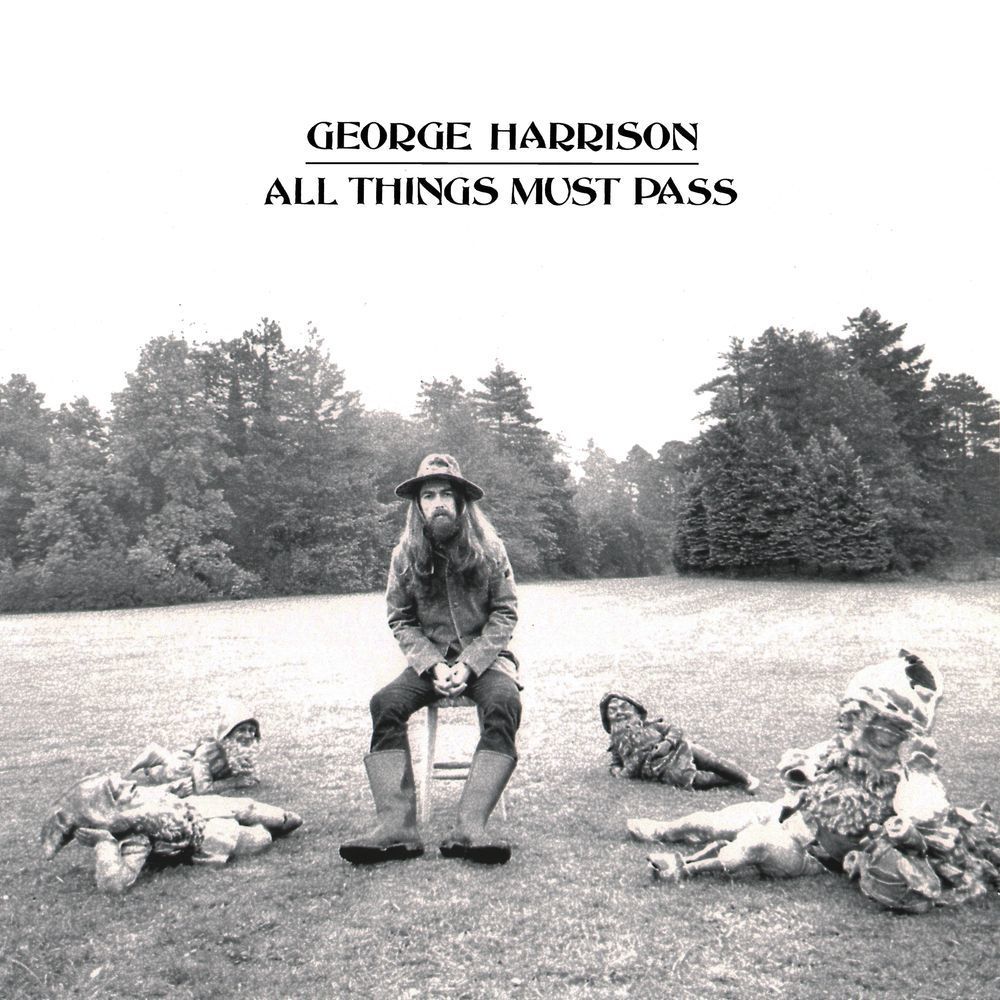
The album was a critical and commercial success, with it going number one along with its single “My Sweet Lord.”6 He would go on to make a few more significant albums in the 70s, such as Living in the Material World (1971) and George Harison (1979), but by the end of the decade, Harrison fell out of the mainstream almost entirely.
After his solo debut album, he went on to do charity concerts for the people of Bangladesh, and he released more music to critical success: Living in the material world reached number one in the U.S. charts and was received very well.7 However, in 1974 things took a turn for the worse for Harrison. In retrospect, the year was on track to be his biggest year yet: he created a new music label; he announced his first tour since The Beatles last concert back in 66′; and lastly, he released a brand new album titled Dark Horse. But the album became his biggest critical and commercial failure to date, and the following tour unfortunately had the same fate. George’s voice was gone from heavy drug use, especially from cocaine, which proved to be the most harmful. He resorted to coating his throat with lots of honey before every show. His shows also had long sets from his openers Billy Preston and Ravi Shankar, leaving audiences restless. The critics had a field day with Harrison’s work in 1974, and seemingly had no end. Harrison said in a press conference, “And I don’t care if anyone comes to see me, nobody buys another record from me. I don’t give a shit.” Couple all of this with a messy divorce from his wife Patti, who was leaving him for his good friend Eric Clapton, Harrison was in the doldrums, with all signs pointing to a sad end to an amazing career.8
“I never knew that life was loaded, I only hung around birds and bees, I never knew that things exploded, I only found it out while I was down upon my knees, looking for my life.” –George Harrison, “Looking for my Life,” Track 4 on Brainwashed, Parlophone
In 1987, five years after Harrison’s last album Gone Troppo was released, which was a critical and commercial dud, his 11th studio album Cloud Nine was set to release.9
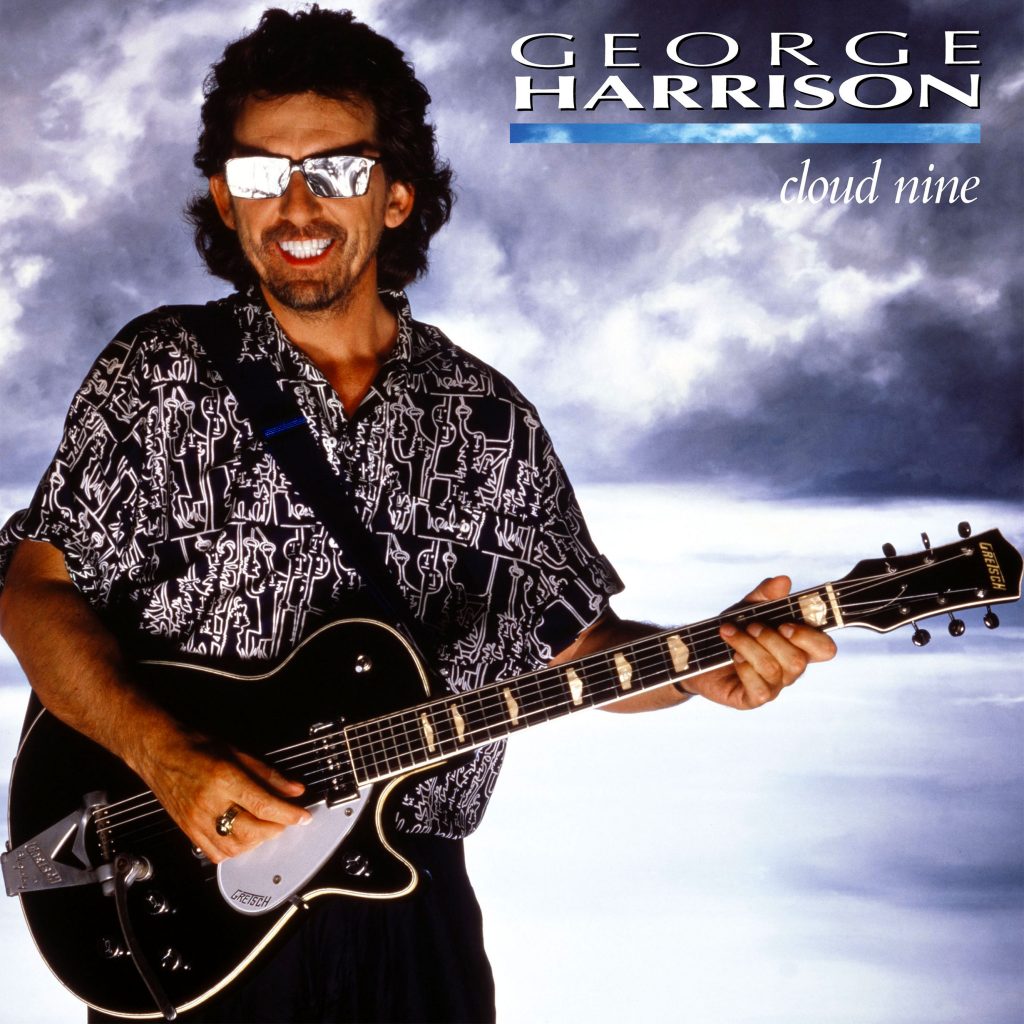
He approached Warner Bros. that year and showed them some demos and other unfinished bits and pieces of the album, and they were excited, and went full throttle with promoting Harrison’s “comeback” album. The album came to be when George was making the music for a movie he was producing starring Madonna and Sean Penn called Shanghai Surprise. He whipped up a few tracks and felt that he might be ready to make another record (and the movie becoming an enormous failure might have had something to do with it too). However, he wanted to find the right producer, someone he could trust and also respect as a songwriter. “I had to have somebody who I respected and who I felt had a legitimate input and, likewise, somebody who was aware of my past and wasn’t just gonna crowd me out or turn me into some sort of thing I wasn’t. That’s all.” And this person that Harrison was trying to find ended up being Jeff Lynne, who was predominately known for the band Electric Light Orchestra. So, through a mutual friend, Dave Edmunds, they met up, and over the span of a year made the album that would become Cloud Nine.10 The album was a huge success, mostly on the strength of its debut single “Got My Mind Set On You,” which reached number one in the charts, and, in fact, became the last single by any Beatle to reach number one ever since. What made this single special, however, was its two music videos that had heavy airplay on MTV. This caused many young people at the time, who didn’t even know that Harrison had been from The Beatles, to appreciate him for his current work. Cloud Nine ended up going Platinum in America, and brought him a new level of fame that even rivaled his time as a Beatle. However, this wouldn’t be George Harrison’s last album to platinum in the 1980’s. In fact, he would have another one the following year, thanks to a little help from his friends.
George Harrison’s distributor in Europe asked him to record a B-side to the third single for Cloud Nine. However, by this time Jeff Lynne was busy producing Roy Orbison’s comeback album Mystery Girl.11 Obviously this presented a problem. So, if George wanted Jeff’s help, he would have to find a way to get him into the studio with him. So, while George was in Los Angeles, he invited Roy and Jeff to dinner, and by the end, he had explained the situation and asked them both to come record a song with him the next day. They fortunately agreed, but now the issue of finding a recording space presented itself. George knew Bob Dylan had a makeshift studio in his house. George phoned him up the next morning and Bob said “come on over.” But before he could go to Dylan’s house, George had to stop by Tom Petty’s house to pick up some guitars that he had left there. And while he was there, he asked Tom if he wanted to tag along as well, and being the youngest of the group, and being such a huge fan of all of these people, he agreed.12 So, there was George Harrison, Bob Dylan, Jeff Lynne, Roy Orbison, and Tom Petty, all in the same studio, ready to write and record a song. George later recalled the moment in the documentary Traveling Wilburys – The True History Of The Traveling Wilburys Documentary, “The thing happened completely just by magic, just by circumstance; maybe there was a full moon out that night or something like that. It was quite a magical little thing really.” George decided to have all the people around him on the song, and they all bounced ideas off each other and everything seemed to fall into place effortlessly. They recorded a song called “Handle Me With Care.” After the label heard this, they were obviously not going to let it become a mere B-side. They wanted a whole album.13
George phoned everyone up and got everyone to agree to make an album, but they needed to do it quickly, as Dylan was going on a world tour that would leave little room in his schedule for anything else. So, they scheduled a ten-day period in May of 1988 to record what would eventually be Traveling Wilburys Vol.1. The name of the album was a way for them to strip away their individual identities and just be a rock group. They were dedicated to this idea fully. The album didn’t even display their actual names in the credits, but instead it displayed their respective Wilbury alter egos: Harrison was Nelson Wilbury, Orbison was Lefty Wilbury. They set up to record in Dave Stuart’s home studio in Los Angeles; the vibe was very carefree and fun. Charlie Wilbury (Tom Petty) recalled how he felt about the recording space: “It was a nice environment, you could sit outside, it was warm and the doors were always open.” This state of mind of freedom from the burdens of the world allowed them to get into the perfect mindset for the album. They would take a couple of hours to write a song in the morning, and then by the end of the evening, they had a song done, and they did that for ten days, until the album was finished. The whole process from beginning to end only took six months.14
Their method proved successful, as the album went platinum in America in 1988. David Wild, an editor of Rolling Stone Magazine, opened his review of the album saying, “This is the best record of its kind ever made, then again its the only record of its kind ever made. A low-key masterpiece.”15 However, the traveling Wilburys lost a member not long after the album was released. Roy Orbison passed away of a heart attack. The band was deeply hurt by the news and had to make a difficult decision. They had planned to film a music video for the song “End of the Line.” George always thought that bodies were material and still felt that it was ok for them to continue, “Roy would’ve like us to continue ‘End of the Line.‘ Its a very optimistic song, we love Roy, and life flows on within you and without you. He’s around in his astral body. He’ll be cool.” The end of the 80s proved to be Harrison’s most active and public decade to date, and he planned for this momentum to continue into the 90s.
“On the avenue of sinners, I have been employed, working there till I was near destroyed, I was almost a statistic inside a doctors case, when I heard the message from inner space.” –George Harrison, Rising Sun, Track 5 on Brainwashed, Parlophone
Not having toured since his critically panned 1974 Dark Horse tour, Harrison was still uneasy about the idea; that is, until Eric Clapton offered him a couple of tour dates on the road with him.
“Eric had been touring for quite some time, and in 1990, he was doing a world tour, and he reckoned that wherever he was going, certain people would ask him what I was up to and why I wasn’t doing stuff. Then when I talked to him around the time he was at the Albert Hall in the beginning of 1991 doing the 24 Nights tour, and he said to me, ‘Look, the rest of this year the band are off, so if you wanted to do something with us, then we could back you up and it saves you the problem of getting a band together and all this, why don’t you think about it?’ And I kept meeting Eric over that period of time, and it seemed like it was a good idea actually. It was quite a generous thing for him to offer, and I just thought a lot about it, and I went through the ‘yes no yes no.’ And then finally I decided ‘Yeah, I ought to do it, because if I don’t do it now, next year Eric will be busy again and the opportunity wont arise, and I’ve got to do something sooner rather than later, otherwise I may never ever do a tour.'”16
Since Harrison now had a backing band for his tour, he booked eleven dates across Japan, and would later release the recordings as the 2 CD set Live in Japan. The collection of songs featured not only his solo work, but Beatles material as well, most of which had never been performed live. And with help from Clapton, songs like “While My Guitar Gently Weeps” sounded wonderful, and according to Harrison, sounded better than the original.17 However, one thing Harrison had to do was quit smoking. It was the reason he had infamously lost his voice in the 1974 tour that led to so much slander, and he couldn’t go through that again. He spoke about his problem in a radio interview promoting the release of Live in Japan: “I’ve been smoking for years, and I was trying to give up smoking for probably 20 years. And on many occasions I did, whether it be for a day or a week, but I always got back on it. I was thinking part of the reason for me to do the tour because I had to, if I was ever going to sing again I had to really stop smoking because I was getting to the point where it wasn’t a joke.”18 He went on to talk about musicians as a whole who are addicted to smoking, and how extensive the problem really was for him and for others around him, saying, “Musicians who smoke, I mean, they all recognize the syndrome. You can smoke, whether it be 20 a day, you go in the studio, you end up smoking forty or sixty.” This would prove to be a serious problem for Harrison, because after the Japan tour, he would never tour again.
In 1997, Harrison was diagnosed with throat cancer. It was kept secret at first. He stilled appeared in an interview with MTV that year and showed some liveliness. At first, the cancer was responding well to various treatments.19 So he got to work on what would be his final album. However, about two years into his battle with cancer, tragedy struck. December 30, 1999, at 4:30 in the morning, George’s wife Olivia was awoken by the sound of breaking glass. She quickly woke up her husband and explained what happened to him. George went to investigate the noise. He originally thought it may have been his mother-in-law who was staying with them at the time. He went to the stairs. He then saw that a piece of a statue from outside had been thrown into the house. Then, what Olivia later described as a “maniac” jumped inside.20 He started antagonizing George to try and get him to come down stairs, but George didn’t move. The man “had a voice from the bowels of hell.”21 He suddenly tore up the stairs and then mounted on top of George and stabbed him multiple times, and out of fear Olivia ran back inside their bedroom. “I ran back into the room, and I don’t know, something just took over, and I grabbed a poker. My dad was a big baseball fan and he used to always say ‘follow through’ that’s all I could think of.” Olivia ran out and swung at the man several times, and the blood started streaming down his face. The man finally got off of George, but now was after Olivia. He chased her down and grabbed her by the neck, but then George had managed to get up and threw himself onto the man in a desperate attempt to protect his wife. They all fell onto the floor and Olivia was able to get out and George had pinned him down, and yelled “I’ve got the knife!”22 Thankfully, they were taken to the hospital and were able to get treatment right away. Dhani Harrison, George’s son, recounted: “He was very badly attacked, but by the time he died he didn’t have a single scar on him. I mean, he was like a yogi. He moved on from that, physically and mentally, and didn’t let it affect him.”23 And he couldn’t let it affect him, because he was rushing to complete what would be his last album, and he knew it would be his last.
George passed away November 29, 2001, but before he did, he teased he was working on a new album in his last ever interview, which ended with a Q and A,”I hope to put out a new studio Album, possibly in November, and I have at the moment many songs in various states of completion—possibly 35 songs that I’ve been working on over the years.”24
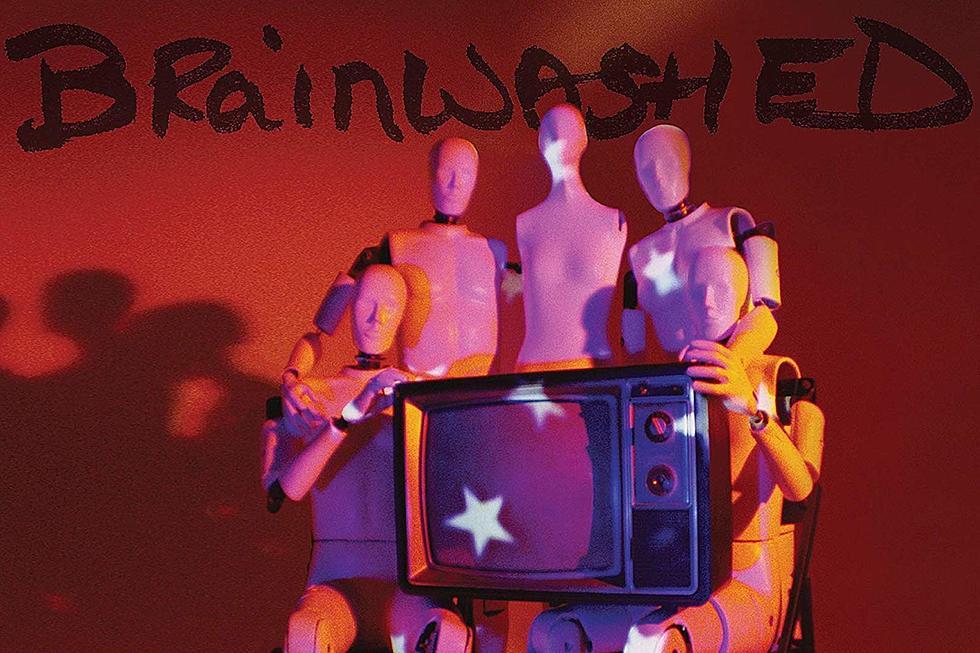
The album that would be known as Brainwashed had been in development for at least three years, as he performed “Any Road” in the MTV interview previously mentioned. If Cloud Nine was an attempt to get back to his songwriting roots, and The Wilburys were to get him back to playing with a band, then Brainwashed for George was an attempt to get back to his roots sonically. Jeff Lynne returned to the studio after George’s death: “What he wanted really, was kind of like demo forms of music, but they deserved more than that as far as I was concerned. And so, sorry George, I made them a little more posher than you may have wanted them. I felt that I was only doing them justice.”25 Jeff Lynne, accompanied by George’s son Dhani, went into the studio and attempted to fit together the pieces George left behind. Dhani recalled: “It was almost as if my dad had the whole thing mapped out and we were just these lab rats trying to find our way through a maze that hadn’t quite been finished yet.”26 The album was very self reflective of his mental state, view on the world, and emotional well-being at this time in his life. Although it wasn’t George’s original vision for the album, the project was a critical success, being nominated for 3 Grammys and winning 1 in Best Pop Instrumental Performance, for “Marwa Blues.” And at this point, George’s career came full circle, as he fought his way back into the mainstream and ending it with an award-winning album.
- Lennon & McCartney Interview, The Tonight Show, Beatles Interviews, 1968. ↵
- Steve Marinucci, “Lennon’s Copy of Document That Ended Beatles’ Relationship With Allen Klein To Be Sold,” Billboard (blog), July 9, 2016, https://www.billboard.com/music/rock/lennon-copy-beatles-document-allen-klein-7431195/. ↵
- Rob Sheffield, Dreaming The Beatles: The Love Story of One Band and the Whole World (Dey Street Books, 2017), 229. ↵
- Ashley Kahn, ed., George Harrison on George Harrison: Interviews and Encounters, Chicago Review Press, Interviews And Encounters (A Capella, 2020), 138. ↵
- George Harrison: Living in the Material World (HBO, 2011), 22:53-24:30. ↵
- “George Harrison,” Billboard (website), https://www.billboard.com/artist/george-harrison/. ↵
- “George Harrison,” Billboard (website), https://www.billboard.com/artist/george-harrison/. ↵
- Rob Sheffield, Dreaming The Beatles: The Love Story of One Band and the Whole World (Dey Street Books, 2017), 264-265. ↵
- Steve Pond, “Gone Troppo,” Rolling Stone (blog), February 17, 1983, https://www.rollingstone.com/music/music-album-reviews/gone-troppo-204909/. ↵
- Ashley Kahn, ed., George Harrison on George Harrison: Interviews and Encounters, Chicago Review Press, Interviews And Encounters (A Capella, 2020), 319-320. ↵
- Ron Hart, “‘Traveling Wilburys Vol. 1’ at 30: Inside the Supergroup to End All Supergroups,” Billboard (blog), October 18, 2018, https://www.billboard.com/music/rock/traveling-wilburys-vol-1-album-jim-keltner-8480621/. ↵
- Traveling Wilburys – The True History Of The Traveling Wilburys Documentary, 1989. 00:00-01:20 ↵
- Ron Hart, “‘Traveling Wilburys Vol. 1’ at 30: Inside the Supergroup to End All Supergroups,” Billboard (blog), October 18, 2018, https://www.billboard.com/music/rock/traveling-wilburys-vol-1-album-jim-keltner-8480621/. ↵
- Traveling Wilburys – The True History Of The Traveling Wilburys Documentary, 1989. 13:00-13:20 ↵
- David Wild, “Traveling Wilburys Volume One,” Rolling Stone, October 18, 1988, https://www.rollingstone.com/music/music-album-reviews/traveling-wilburys-vol-1-103329/. ↵
- Ashley Kahn, ed., George Harrison on George Harrison: Interviews and Encounters, Chicago Review Press, Interviews And Encounters (A Capella, 2020), 460-461. ↵
- Ashley Kahn, ed., George Harrison on George Harrison: Interviews and Encounters, Chicago Review Press, Interviews And Encounters (A Capella, 2020), 462. ↵
- Ashley Kahn, ed., George Harrison on George Harrison: Interviews and Encounters, Chicago Review Press, Interviews And Encounters (A Capella, 2020), 464. ↵
- Ashley Kahn, ed., George Harrison on George Harrison: Interviews and Encounters, Chicago Review Press, Interviews And Encounters (A Capella, 2020), 514. ↵
- George Harrison: Living in the Material World Part 2 (HBO, 2011). 1:36:00-1:36:12. ↵
- George Harrison: Living in the Material World Part 2 (HBO, 2011). 1:37:09-1:37:12. ↵
- George Harrison: Living in the Material World Part 2 (HBO, 2011). 1:38:05-1:38:36 ↵
- George Harrison: Living in the Material World Part 2 (HBO, 2011). 1:38:05-1:38:36. ↵
- Ashley Kahn, ed., George Harrison on George Harrison: Interviews and Encounters, Chicago Review Press, Interviews And Encounters (A Capella, 2020). pg. 532 ↵
- George Harrison – Brainwashed (The Making Of), Documentary (Capitol Records, 2002), https://www.youtube.com/watch?v=vs1YYq9X6_g&t=341s. 01:23-01:43 ↵
- George Harrison – Brainwashed (The Making Of), Documentary (Capitol Records, 2002), https://www.youtube.com/watch?v=vs1YYq9X6_g&t=341s. 01:23-01:43 ↵
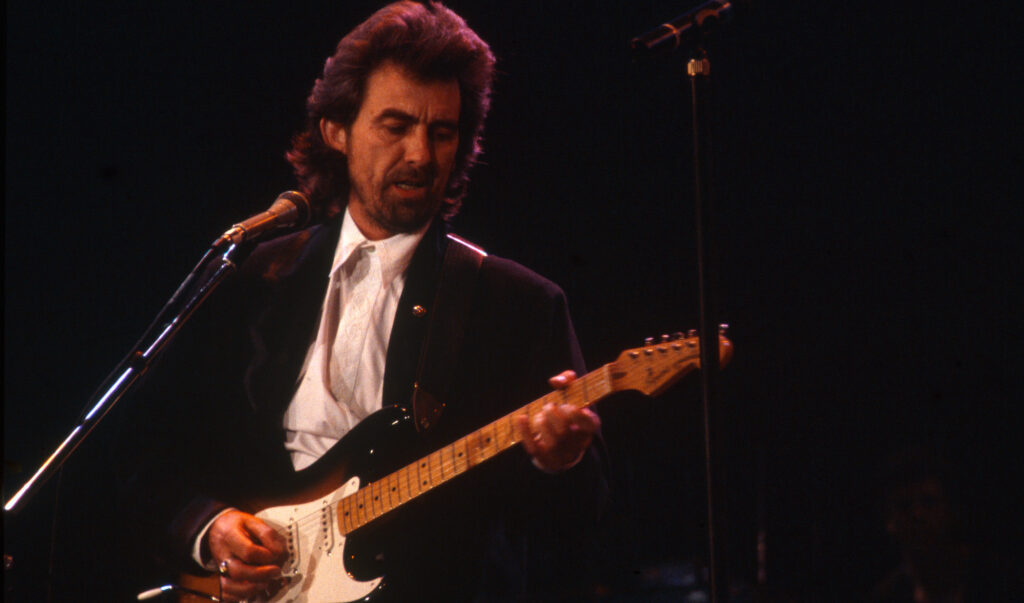

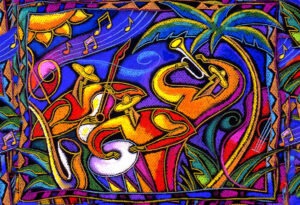

37 comments
Maya Naik
Hi Jacob! Congratulations on your nomination, it is truly well-deserved. Your writing on the history of George Harrison was excellent and informative. It was refreshing to read an article about a famous band that has made significant contributions to our society. Their music has inspired many and created a generation of musically inspired individuals. I appreciate your publication, and I encourage you to keep up the great work.
Carlos Alonzo
Hey Jacob interesting article and congratulations on your nomination. This track by George Harrison shows music composition at it’s finest. The lyrics and melodic composition allows the listeners to accept the music for what it is. There’s totally thoughtfulness here when creating the music and has the sufficient theme of teaching people to enjoy the journey and not just the destination.
Joseph Frausto
Congratulations on the win at the research symposium. As a huge Beatles fan who grew up in a household full Clapton fans, some of the perspectives and stories related through this article were really interesting to me. What an interesting and unique topic. Great job!
Tabitha Babcock
Jacob, this was a fantastic article. I really like your writing style. You, like me, love an oxford comma and a parenthetical. I also liked how you inserted quotes from different songs off the album that were relevant to the section. I won’t lie to you, I’m not a huge fan of the Beatles (more of a Beach Boys girl myself) but this piece on George kept my attention for way longer than I thought it would. I added all things must pass, cloud 9, the traveling Wilburys vol 1, and of course brainwashed to my Spotify library and am looking forward to listening to them. I’ve literally never heard of the traveling Wilburys which is surprising to me because its such a star-studded group. I loved how they accidentally came together. Definitely fate. My one complaint with this article is that you breezed past the women a bit too fast (hater). I need more of the drama from Harrisons ex wife, I can’t believe she left him for Clapton. And then his second wife, I need to know more about her! Shes an absolute badass. Swinging at the attacker like that. I’m gonna have to google how they met.
Sudura Zakir
Awesome article with The Beatles, excellent work for mentioning George Harrison in your article. I really enjoyed reading it. Article about a famous band in the past which inspired the heart of many present musicians to expand their musical horizons. I was born listening to guitar because of my dad and honestly, my knowledge of music and band includes these popular bands. I listened to some of their songs too.
Aaron Astudillo
Congratulations on the nomination, it is well deserved. You did an excellent job of writing over the history of George Harrison. It was interesting to read an article over a famous band that has created so many contributions to our society. Their music has led to inspire others and create a generation of musically inspired individuals.
Maximillian Morise
A fun article on the behind the scenes history of The Beatles and the chaos and personal politics of its various members and the history behind them. Congratulations on your article, it was extremely well thought out and a blast to read!
David Duron
The writer has done an excellent job of summarizing the complex history of The Beatles and George Harrison’s solo career in a concise and engaging manner. The article provides a clear narrative flow and incorporates quotes from Harrison himself to give readers a deeper understanding of his motivations and struggles. Overall, the writer has crafted an informative and enjoyable piece of music journalism.
Abbey Stiffler
My interest in what you had to say about such a well-known artist was immediately piqued by your intriguing hook and intriguing title. It gave readers the chance to discover more about the Beatles as well as the struggles and fights that George Harrison overcame in order succeed and continue to be successful in the sense that he left an imprint for his Dhani. Such a fantastic essay overall!
Isabel Soto
I want to start this off by congratulating you on getting your article published. It is such an interesting article! It was very refreshing reading about something that was a band that was so influential in the music culture.It allowed readers to learn more about the Beatles and the battles and hardships that George Harrison had to overcome to triumph and still be victorious in the way that he left a legacy for his Dhani.